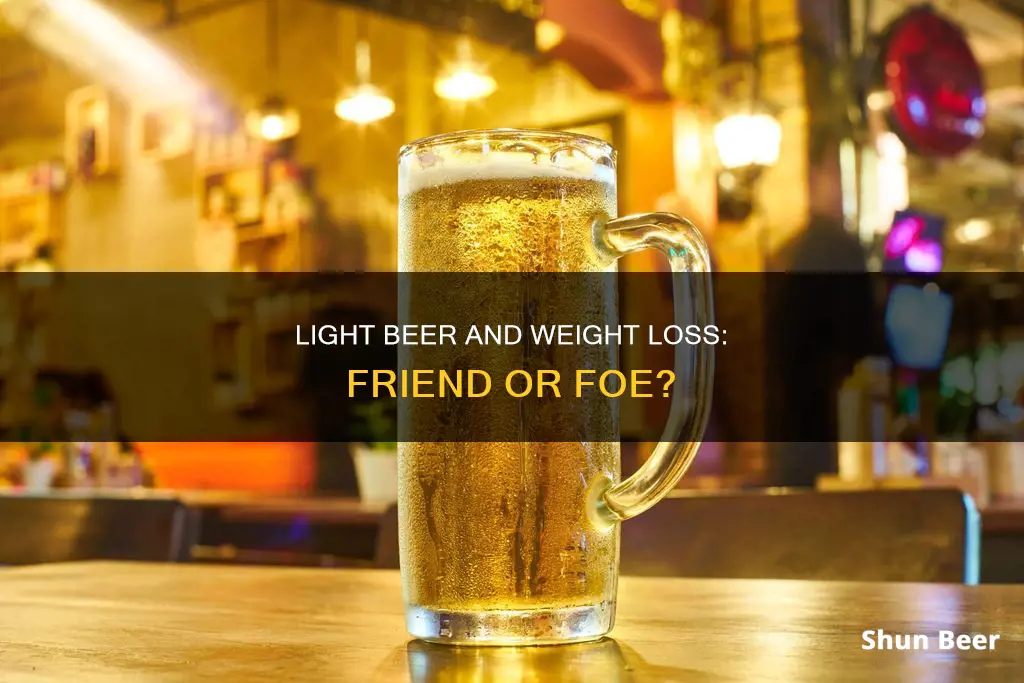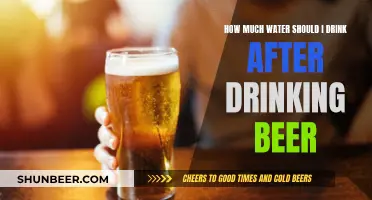
It is possible to lose weight while still drinking light beer, but it is important to do so in moderation. Alcohol is known to deliver calories without nutritional benefits, and drinking too much can hinder weight loss and even lead to weight gain. However, light beers tend to have lower calories than regular beers, so opting for light beers can be a better choice for those looking to lose weight. It is also important to be mindful of the mixers used in drinks, as they can contain a lot of sugar and calories. Additionally, drinking beer may interfere with the body's ability to burn fat efficiently, as the body prioritises breaking down alcohol for energy over burning stored fat. Therefore, drinking light beer in moderation, combined with other diet and lifestyle changes, can help in losing weight.
| Characteristics | Values |
|---|---|
| Can drinking light beer help with weight loss? | Yes, but only when consumed in moderation and combined with other diet and lifestyle changes. |
| Calories in light beer | Vary depending on the brand and ABV, but generally contain fewer calories than regular beer. |
| Effect on weight loss | Light beer may contribute to weight loss by reducing overall calorie intake. |
| Recommended intake | Moderate drinking is defined as 1-2 drinks per day for men and up to one drink for women. |
| Other considerations | Light beer may interfere with fat burning and lead to weight gain in other parts of the body besides the belly. |
What You'll Learn

Light beer has fewer calories than regular beer
Beer is made from cereal grains, most commonly barley, and the brewing process involves converting the carbohydrates in these grains into alcohol. The higher the alcohol content, the more calories the beer will contain. Light beers are brewed to have a lower alcohol content, which means they also contain fewer calories.
For example, a regular Budweiser contains about 40% more calories than a Bud Light. A pint of lager contains around 180 calories, while a small glass of wine is around 100 calories.
If you are trying to lose weight, choosing a light beer over a regular beer can help reduce your calorie intake. However, it is important to remember that alcohol provides empty calories, meaning they have no nutritional value. Additionally, drinking alcohol can affect your appetite, sleep quality, and the way your body burns fat. Therefore, while light beer may have fewer calories, drinking any type of alcohol should be done in moderation if you are trying to lose weight.
Beer Drinking: Nightly Habit and Its Health Impact
You may want to see also

Alcohol can be considered empty calories
Alcoholic drinks are often high in calories, and these calories are considered "empty" because they have no nutritional value. Alcohol is toxic to the body, and when it is consumed, the body must prioritise getting rid of it, which interrupts other processes such as absorbing nutrients and processing fat. This can lead to weight gain, particularly around the middle, and increase the risk of becoming overweight or obese.
Alcohol contains almost as many calories per gram as fat. A pint of lager, for example, contains roughly the same amount of calories as a standard slice of pizza, and a large glass of wine has the same amount as a typical ice cream sundae. A small glass of wine contains around 100 calories, and a gin and tonic can be as little as 60 calories, while a pint of lager has about 180 calories.
The calories in an alcoholic drink are not just from the alcohol itself but also from other ingredients such as sugar. Each drink contains approximately 100-150 empty calories. These extra calories can add up, especially if drinking is a regular occurrence, and can contribute to weight gain.
In addition to directly adding calories, alcohol can also affect overall calorie intake. Research has shown that having a drink with a meal can increase the amount of food consumed. Alcohol decreases inhibition and creates changes in brain chemistry that increase the reward gained from eating. These effects can also lead to ordering another drink.
People who drink alcohol regularly may find it challenging to manage their weight. However, it is possible to lose weight and still drink beer, wine, and other alcoholic beverages in moderation. The key is to be mindful of drinking habits and to track alcohol consumption, treating it the same as any other calorie when tracking intake.
Breastfeeding and Beer: Is One Drink Okay for Baby?
You may want to see also

Drinking in moderation is key
The problem with drinking alcohol while trying to lose weight is that alcohol provides a quicker, more accessible form of energy for your body than fat. Your body will always opt for the quickest and easiest energy source, which means it will prioritise breaking down alcohol over burning fat.
However, this does not mean that you have to cut alcohol out of your life entirely. It is still possible to enjoy a drink with friends without sabotaging your weight loss goals, as long as you practice moderation and balance. Here are some tips to help you drink in moderation while trying to lose weight:
- Set a drink limit for yourself before going out and make a commitment to stick to it.
- Choose healthier drink options. Opt for clear spirits with soda water or a glass of wine instead of sugar-packed cocktails.
- Stay hydrated by alternating every alcoholic drink with a glass of water.
- Don't skip meals before drinking, but opt for a healthy dinner full of lean protein and good fats to slow down the absorption of alcohol into your bloodstream.
- Avoid eating high-fat or high-calorie foods while drinking, as this will provide your body with excess energy that will be stored as fat.
- Track your alcohol calories along with your food calories to ensure you don't exceed your daily limit.
Beer and G6PD Deficiency: What You Need to Know
You may want to see also

Alcohol may hinder weight loss by providing a quicker, more accessible form of energy than fat
In addition to this, alcohol also contains empty calories, which provide no nutritional value. Excessive consumption of alcohol can therefore lead to weight gain. For example, a Piña Colada cocktail can contain anywhere between 250 to over 400 calories. This means that a night of drinking can add a substantial number of calories, which can hinder weight loss.
Furthermore, alcohol can negatively impact sleep quality. While alcohol may help people fall asleep faster, it can also cause people to wake up in the middle of the night or early in the morning. Poor sleep quality can then impact metabolism and hormone levels, which can contribute to weight gain.
However, it is important to note that moderate alcohol consumption may not necessarily hinder weight loss. According to the Dietary Guidelines for Americans, moderate drinking is defined as two or fewer standard drinks per day for men and one or fewer standard drinks per day for women. Additionally, light to moderate alcohol consumption has been associated with less weight gain and a lower risk of becoming overweight. Therefore, drinking in moderation and being mindful of alcohol consumption can help ensure that alcohol does not hinder weight loss.
Beer and TB Treatment: Is It Safe?
You may want to see also

Drinking beer may interfere with your body's ability to burn fat
The impact of alcohol on fat burning is twofold. Firstly, alcohol itself contains calories, which can contribute to weight gain if consumed in excess. Secondly, when you drink alcohol, your body focuses on metabolising it before any other nutrients, creating a metabolic environment that inhibits fat burning. This means that even if you're eating a healthy diet, drinking alcohol can slow down your body's ability to burn fat.
Additionally, alcohol can affect your appetite and increase your cravings for high-fat, savoury foods. This can lead to poorer food choices and higher calorie intake, further interfering with your body's ability to burn fat.
To minimise the impact of alcohol on your body's fat-burning capabilities, it's important to practise moderation and make conscious drink choices. Opting for light beers or lower-% ABV drinks can help reduce your calorie intake. Additionally, alternating alcoholic drinks with water or low-calorie beverages can also help reduce the overall number of calories consumed.
While it's not necessary to completely abstain from alcohol when trying to lose weight, being mindful of your drink choices and consumption can help support your weight loss goals and ensure your body can still effectively burn fat.
Beer and Stroke Recovery: What You Need to Know
You may want to see also
Frequently asked questions
Yes, it is possible to drink alcohol and lose weight, but it depends on the type and amount of alcohol you consume, as well as your overall diet and lifestyle.
Alcohol provides empty calories and can hinder weight loss or even lead to weight gain. It also affects your sleep quality, appetite, and how your body burns fat.
Opt for drinks with lower calories, such as light beers, low-sugar wines like Pinot Noir, or spirits with low-calorie mixers.
Yes, it's important to drink in moderation and be mindful of your overall calorie intake. You can also try alternating alcoholic drinks with water or low-calorie soft drinks, staying hydrated, and avoiding high-fat meals or snacks while drinking.







